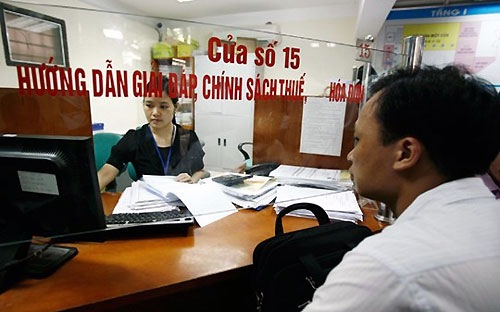The Draft Circular providing guidance on accounting regimes of extra-small enterprises is currently open for comments on the Government's electronic portal, which applies to extra-small enterprises in Vietnam, including those that pay corporate income tax based on the income tax calculation method and the percentage method on revenue from the sale of goods and services.
View more details: DRAFT CIRCULAR GUIDING ACCOUNTING REGIMES OF EXTRA-SMALL ENTERPRISES
Regulations on formulation and signing of accounting documents
- According to Vietnam’s regulations, an accounting record shall be made for each economic/financial transaction that occurs during the operation of an accounting unit.
+ Only one accounting record shall be made for each economic/financial transaction.
+ Contents of the copies of an accounting record for an economic/financial transaction must be identical.
- Accounting records prepared by the enterprise must be made in a clear, complete, timely, and accurate manner in accordance with the set form.
- Economic/financial transactions on accounting records must not be abbreviated, erased, changed. Text must be written by pen; digits and letters must be written continuously without interruption; blank spaces must be crossed out.
Notably, accounting records that are changed are not valid for payment and recording in accounting books. Every incorrect accounting record must be crossed out.
- An accounting record must have sufficient signatures. Accounting records must be signed with indelible ink. It is prohibited to use red ink or rubber signature stamps on accounting records. Signatures on accounting records appended by the same person must be consistent. The persons who make, approve, and other persons that sign the accounting record are responsible for its content.
- If the enterprise does not have a chief accountant or has not assigned a chief accountant, it must appoint someone to be responsible for accounting transactions with customers, banks, etc., and the signature of the chief accountant can be replaced with the signature of the person in charge of accounting for the unit. The person in charge of accounting has the same responsibilities and rights as the chief accountant.
- Accounting records must be signed by competent persons or authorized persons. It is prohibited to sign an accounting record that does not have sufficient content.
- The General Director (or Director) of the enterprise is responsible for determining the delegation of signatures on accounting documents.
- Accounting records on payment must be signed by the person competent to approve payments and the chief accountant or an authorized person before making such payment. Every copy of an accounting record on payment must be signed.
Regulations on accounting books
- Accounting books shall be opened at the beginning of the annual accounting period. Newly-established enterprises shall open their accounting books from the inauguration date.
- Accounting records are the basis for making accounting books. Accounting books must be made clearly, completely, and in a timely manner. Information and data recorded in the accounting books must be accurate, truthful, and consistent with accounting records.
- Information and data on the accounting books must be recorded by pen, must not be inserted at the top or bottom and must not overlap; no lines shall be skipped; any empty space of the page must be crossed out; if one page is not enough, a sum must be done at the end of each page and carried forward to the next page.
- Economic/financial transactions must be recorded in the accounting books in chronological order. Information and data recorded in accounting books of the next year must continue those on the accounting books of the preceding year. An accounting book must be continuously made from the beginning to the closing of the book.
- Extra-small enterprises may, of their own accord, design forms, charts and templates of accounting books appropriate for their business activities provided that they ensure clarity, transparency, and are easily checked or controlled.

Extra-small enterprises are not required to have chief accountants
According to the Draft Circular, extra-small enterprises are allowed to appoint individuals to be responsible for accounting without the requirement to appoint a chief accountant. In addition, extra-small enterprises may appoint the following individuals as accountants:
- Biological parents, adoptive parents, spouse, biological children, adopted children, siblings of the legal representative, director, or general director, deputy director, or deputy general director in charge of financial and accounting affairs, and the chief accountant (accounting supervisor) of the enterprise.
- Individuals who are currently managers, executives, storekeepers, treasurers, or individuals regularly entrusted with purchasing and selling the assets of the enterprise.
Forms of accounting documents
Extra-small enterprises paying CIT calculated according to the method of calculation of CIT based on assessable income shall use accounting documents listed hereunder:
- Cash receipt - Form No.01-TT;
- Cash payment note - Form No.02-TT;
- Goods-received note - Form No.01-VT;
- Goods dispatch note - Form No.02-VT;
- Fixed asset handover and receipt report - Form No.01-TSCD;
- Wage, salary and other income payment worksheet - Form No.01-LDTL.
And other accounting documents such as: VAT or sales invoice; Slip of payment of taxes to the State Budget; Bank’s Debit note.
In addition to the accounting documents mentioned above, extra-small enterprises may opt to use accounting documents referred to in Circular No. 133/2016/TT-BTC of the Ministry of Finance of Vietnam.
List of accounting accounts
- Thuy Phu -
- Key word:
- Draft Circular
- Circular No. 132/2018/TT-BTC
 Article table of contents
Article table of contents










.Medium.png)
.Medium.png)
.Medium.png)
.Medium.png)
